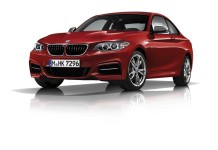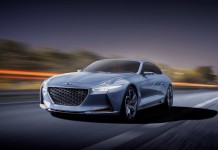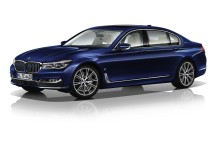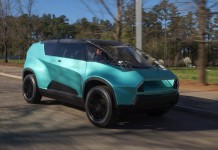One of the few complaints people have had about BMW’s all-electric i3 is its relatively short range. It’s a fantastic city car, provided you can find a place to charge it when you park during a day of shopping, since the current 81-mile combined range isn’t optimal for exploring the back roads around town.
BMW has recognized these complaints and upped their game. For 2017 they have added a new model range under the cryptic moniker of i3 (94 Ah), which should make those with a long commute much happier.
Basically what you get is 33% more range compliments of a new Samsung battery, with a greater range of 114 miles. Around town expect even better numbers, as BMW’s regenerative braking system does a great job of recharging the batteries to extend the life of a charge.
Performance numbers haven’t changed a whole lot for the new and improved model, so expect the same 170 hp electric motor to scoot your greenmobile to 60 in about 7 seconds. A sedate pace, to be sure, but by no means is it a danger on the interstate entrance ramp.
If there is one flaw in all this power, it’s the charging time. Road trips won’t be this car’s forte, but nobody buys a car like this for driving cross-country anyway. The new batteries require an hour longer to juice up than the smaller pack – 4.5 hours vs. 3.5 hours for the lower-capacity model – though this won’t matter to most buyers since the majority of i3s are parked and plugged in every night at home.
The 2017 i3 should hit your local dealer sometime in the third quarter of 2016, and pricing should be available closer to that time.










That is strange. My 2011 Nissan Leaf, with 65 miles of range takes me where ever I need during a day without need of recharge. As to the recharge time, both the Leaf and the i3 have DC Fast Charging capability. In 30 minutes my car charges up to 95%. Perhaps the author needs to check with owners of EV’s for data.
The author notes that the BMW does a fantastic job of recharging around town with regenerative braking, much like most EV vehicles do. BMW themselves state that to get to full capacity on their batteries, the latest, higher capacity battery pack requires 4.5 hours on Level 2 as opposed to 3.5 hours on the original battery pack. On level 2, which is more common and significantly less expensive in most areas than a Fast Charger, a Leaf requires 4-6 hours to get to a full charge, per Nissan. Note the author doesn’t say anything about “95%” charging. Quick charging is also not recommended to be done on a regular basis by manufacturers because it can slightly hinder long term battery life.
Per BMW: “The 7.4 kW charging electronics of the BMW i3 (94 Ah) can charge the 33 kWh battery in approximately 4.5 hours using a Level 2 charger, which is slightly more than the approximately 3.5 hours required to charge the battery on a BMW i3 (60 Ah).”
Source: https://www.press.bmwgroup.com/usa/article/detail/T0259560EN_US/the-new-2017-bmw-i3-94-ah-:-more-range-paired-to-high-level-dynamic-performance
Perhaps the author needs to check with EV owners about why a small number of them are so quick to be defensive and/or snarky.